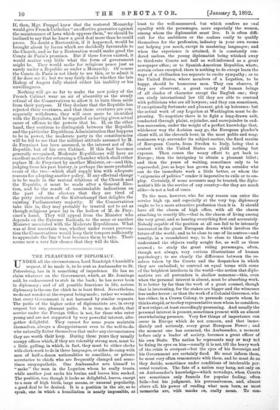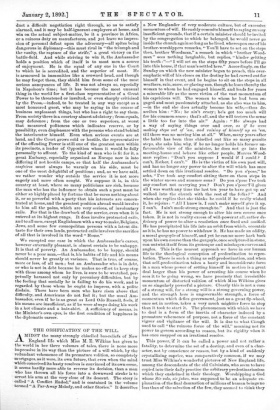THE PLEASURES OF DIPLOMACY.
UNDER all the circumstances, Lord Randolph Churchill's request, if he made it, to be sent as Ambassador to St. Petersburg, has in it something of impudence. He has no claim whatever on the Government, which, as Mr. Jennings said, he endeavoured to stab in the back ; he has never been in diplomacy ; and of all possible functions in life, serious diplomacy is the one for ,vhich he is least fitted. Nevertheless, we do not wonder at the request being made ; rather we wonder that every Government is not harassed by similar requests. The paths of the higher order of diplomatists are, in every respect but one, pleasant paths. It is true, no doubt, that service under the Foreign Office is not, for those who enter young and are not supported by very powerful interest, alto- gether delightful. They cannot for some years maintain themselves, always a disappointment even to the well-to-do, who naturally flatter themselves that under any circumstances they are worth their keep. During those years they usually occupy offices which, if they are tolerably strong men, must be a little galling, in which, in fact, they must be either clerks with clerk-work to do in three languages, or aides-de-camp with men of half-a-dozen nationalities to conciliate, or private secretaries to chiefs who are frequently changed and some- times unsympathetic. One Ambassador sets himself to " make " the man in the Legation whom he really trusts, while another just sucks his brains, and leaves him sucked. The position, too, though it looks so delightful, leaves, except to a man of high birth, large means, or unusual popularity, a good deal to be desired. It is a position in the air, so to speak, one in which a humiliation is nearly impossible, at least to the well-mannered, but which confers no lea' equality with the personages, more especially the women, among whom the diplomatist must live. It is often diffi- cult for the ambitious or the zealous really to qualify themselves for the profession, industry in your own rooms not helping you much, except in mastering languages ; and when the experience is attained, it is constantly ren- dered useless, the young diplomatist being whisked away to third-rate Courts not half as well-informed as a great newspaper office; or to Spanish-American Republics, where, certain crises excepted, there is nothing to do except learn the ways of a civilisation too separate to excite sympathy; or to the United States, where members of a Legation, to be happy, should be humorous men. They can observe, if they are observant, a great variety of human beings of all shades of character except the English one ; they can study international law till they are able to contend with politicians who are all lawyers; and they can sometimes, if exceptionally fortunate and pleasant, pick up heiresses: but the actual work of any Legation at Washington must be de- pressing. To negotiate there is to fight a long-drawn suit, conducted through plaint, rejoinder, and surrejoinder in end- less succession, under the weight of a perfect knowledge that, whichever way the decision may go, the European pleader's client will, at the eleventh hour, in the most polite and mag- nanimous way, surrender its subject-matter, the fixed maxim of European Courts, from Sweden to Italy, being that a contest with the United States can yield nothing but expense. Then comes the weary effort to get back to Europe ; then the intriguing to obtain a pleasant billet ; and then the years of waiting, sometimes only to be superseded, just as hope has grown hot, by an outsider who can do the immediate work a little better, or whom the " exigencies of politics" render it imperative to exile or to em- ploy. Certainly, if some accounts may be trusted, the diplo- matist's life in the service of any country—for they are much alike—is not a bed of roses.
To the man, however, who for any reason can enter the service high up, and especially at the very top, diplomacy ought to be a more attractive profession than it is. It should have all the charm of high office, with all the charm attaching to courtly life,—that is, the charm of living among the very great, and so hearing everything first and accurately. Nobody capable of the position at all can fail to be intensely interested in the great European drama which involves the future of the world ; and to be close to one of its centres—and usually, in a roundabout way, to be close to them all—to understand the objects really sought for, as well as those avowed ; to study the great ruling personages, often, though not always, very curious illustrations of human psychology ; to see clearly the difference between the re- solves taken by the Courts and the despatches in which they are embodied; to contend on equal terms with some of the brightest intellects in the world—the notion that diplo- matists are all pretenders is shallow nonsense—this, even when the personal interest is absent, must be absorbing work. It is better by far than the work of a great counsel, though that is interesting, for the stakes are bigger and the witnesses less under terror ; or than the work of a Colonial Governor, who has either, in a Crown Colony, to persuade experts whom he thinks stupid, or to obey representative men whom he considers, if not vulgar, at least exceedingly presuming. And usually the personal interest is present, sometimes present with an almost overwhelming pressure. -Very few things of importance can occur in Europe which do not concern, and that imme- diately and seriously, every great European Power ; and the moment one has occurred, the Ambassador, a moment before only a leader of society, becomes a great officer of his own State. The nation he represents may or may not be fixing its eyes on him—usually it is not, till the heavy work of the crisis is overpast—but the eyes of his Sovereign and his Government are certainly fixed. He must inform them, he must very often remonstrate with them, and he must do as they decide, sometimes under conditions of intolerable per- sonal vexation. The fate of a nation may hang, not only on an Ambassador's knowledge—which nowadays, when Courts are sometimes only funnels for popular feeling, often fails—but his judgment, his persuasiveness, and, almost above all, his power of reading what men born, as most monarchs are, with masks on, really mean. To eon- duct a difficult negotiation right through, so as to satisfy alarmed, and it may be half-ignorant employers at home, and win on the actual subject-matter, be it a province in Africa, or a ruinous duty on manufactures, and yet leave no impres- sion of personal defeat upon the adversary—all spites being dangerous in diplomacy—this must rival in " the triumph and the vanity, the rapture of the strife," a great victory on the battle-field. And while striving to win it, the Ambassador holds a position which of itself is to most men a source of enjoyment. He is the equal of any one in the Court to which he is accredited, and the superior of most. He is armoured in immunities like a crowned head, and though he may forget them, they shield him from some of the most serious annoyances of life. It was not always so, especially in Napoleon's time ; but it has become the most unusual thing in the world for a first-class representative of a Great Power to be threatened or insulted, or even sharply criticised by the Press,—indeed, to be treated in any way except as a most honoured guest, who may be saying in the course of business unpleasant things, but who has a right to say them. From society there is a courtesy almost adulatory ; 'from equals, easy deference ; from the one or two superiors, at worst that measured politeness which indicates reserve, or by possibility, even displeasure with the persons who stand behind the interlocutor himself. Even when serious events are at hand, and the Court grows cold or hostile, the representative of the offending Power is still one of the greatest men within its precincts, a leader of Opposition whom it would be folly personally to affront. To the kind of man who is fit for it, a great Embassy, especially organised as Europe now is into differing if not hostile camps, so that half the Ambassador's confreres must always be warmly on his side, must be one of the most delightful of positions ; and, as we have said, we rather wonder why outside the service it is not more eagerly and more often sought. We suppose it is, in this country at least, where so many politicians are rich, because the man who has the influence to obtain such a post must be either so highly placed by fortune that he cares nothing about it, or so powerful with a party that his interests are concen- trated at home, and the greatest position abroad would involve to him all the pains, which are very serious, of involuntary exile. For that is the drawback of the service, even when it is entered at its highest rungs. It does involve protracted exile, and to all men, except Englishmen with a way to make, Belgians, Jews, and some few cosmopolitan persons with a latent dis- taste for their own lands, protracted exile involves the sacrifice of all that is involved in the word " Home."
We excepted one case in which the Ambassador's career, however externally pleasant, is almost certain to be unhappy. It is that of poverty. An Ambassador, to be happy, should never be a poor man,—that is, his habits of life and his means should never be greatly at variance. That is true, of course, more or less, of all men ; but an Ambassador who is in debt, or who is not in debt because he makes no effort to keep step with those among whom he lives, is sure to be wretched, per- petually harassed not only by pecuniary difficulties, but by the feeling that socially he is failing to do his work, and is regarded by those whom he ought to impress, with a polite disdain. There have been men who have risen above that difficulty, and Americans do not feel it ; but the usual Am- bassador, even if he is as great as Lord Odo Russell, feels, if his means are insufficient, as if he were always doing his work in a hot climate and a hair-shirt. A sufficiency of means, in the Minister's own eyes, is the first condition of happiness in the diplomatic career.















































 Previous page
Previous page